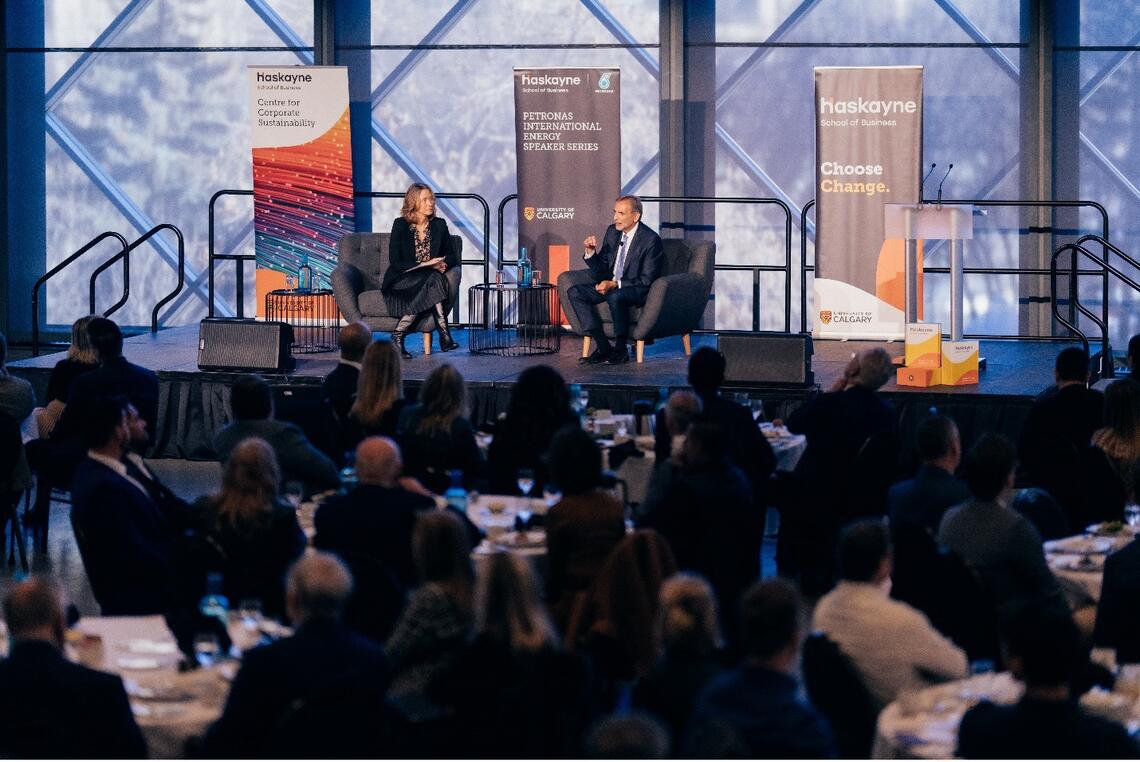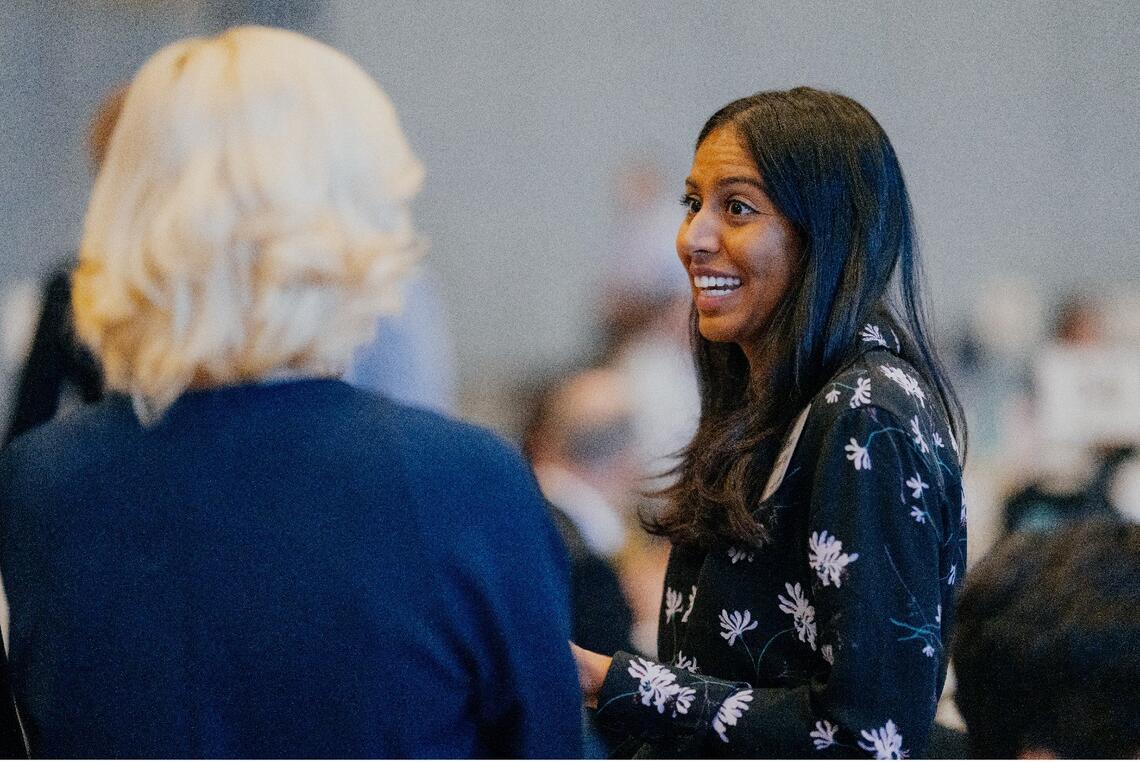March 1, 2024
6th annual PETRONAS International Energy Speaker Series tackles geopolitics and climate change

Even though the COP28 summit in Dubai concluded in December, the PETRONAS International Energy Speaker Series, presented by the Centre for Corporate Sustainability at the Haskayne School of Business on Feb. 1, picked up where COP28 left off, elaborating on its major themes that are set to reimagine global finance.
Since 2017, the PETRONAS Series has brought global thought leaders to Calgary. This signature Haskayne event brings an international perspective on energy-related issues to Calgary and allows local industry players to engage in conversation with leaders from oil and gas, as well as the broader energy sector.
For the event’s sixth instalment, Haskayne welcomed Carlos Pascual, senior vice-president of geopolitics and international affairs with S&P Global, Commodity Insights, and Jackie Forrest, BSc (Eng)’96 and executive director, ARC Energy Research Institute. Haskayne was thrilled to bring close to 400 members of the business community together to discuss these critical energy themes.
Industry leaders give insight into changing global economy

The sixth instalment of the PETRONAS International Energy Speaker Series.
Kelly Hofer, for the Haskayne School of Business
Pascual served as the energy envoy and co-ordinator for international energy affairs for the United States and was director of the Energy Resources Bureau at the U.S. Department of State, as well as a senior adviser to the secretary of state, serving under former presidents Bill Clinton and Barack Obama. He was also the U.S. ambassador to Ukraine from 2000 to 2003 and ambassador to Mexico from 2009 to 2011.
Pascual, in a discussion about the often-contradictory predictions of long-term local and global energy demands, emphasized the relationship between business investments and the global energy sector and the changes in industry and industry leaders. Linking back to COP28, Pascual spoke to the paradigm shift in geopolitics with a growing north-south divide.
“Developing countries are rightly saying that they need help with debt relief and access to capital, of energy access to be able to fuel their economies,” Pascual said. “But, in the meantime, the nature of the international order to support that has become more and more complex.”
Pascual also touched on how the target set at COP28 of where we should be by 2030 by global leaders on the path to net zero is far below where emission levels actually are. This causes a debate between phase-out and phase-down when it comes to fossil fuels, but the challenge is how to get close to the ambitious targets.
“We know that the demand for oil will still be strong, the peak for oil demand is 2031,” Pascual said. “The Organization for Economic Cooperation and Development (OECD) countries may have already peaked and the majority of the demand going forward will be in non-OECD countries.”
Meeting net-zero goals, he said, requires a monumental shift in the dynamic between energy and fossil fuels, ushering in profound social, political, technological, commercial and economic changes.

The fireside chat at the sixth instalment of the PETRONAS International Energy Speaker Series on Feb. 1.
Kelly Hofer, for the Haskayne School of Business
As part of the fireside chat, Pascual was asked his opinion on the recent reports coming out of the International Energy Agency (IEA). The IEA has been a broker of oil and gas and energy data for decades and is now seeming to advocate that the global economy should go on the net-zero 2050 path that doesn’t practically exist, because it is not possible to transition the world’s energy economy that quickly.
“To say that this is an easy task and that we don’t need oil and gas going into the future when we haven’t understood what is going to satisfy that energy demand in the interim, I think that does become problematic,” said Pascual in conversation with Forrest.
PETRONAS Canada renews partnership with Haskayne’s Centre for Corporate Sustainability
PETRONAS Canada has extended its support for the speaker series with a second sponsorship, allowing for two more years of engaging, thought-provoking events, in addition to this past event.
“(We are) proud to continue our support for the PETRONAS International Energy Speaker Series,” says Izwan Ismail, president and CEO, PETRONAS Canada. “Bringing together the diverse and thoughtful perspectives of international experts provides invaluable insight into how we can take a global approach to our energy future.”

Guests network at the PETRONAS International Energy Speaker Series event.
Kelly Hofer, for the Haskayne School of Business.
In Calgary, where the oil and gas industry plays a significant role in the economy, engaging in climate change conversations like these is paramount. Understanding the impacts of climate change and exploring sustainable solutions are essential steps towards a resilient future. These discussions allow for informed decision-making, fostering innovation and adaptation within the energy sector.
“We are very excited to extend our partnership with PETRONAS Canada, which will allow us to continue to host the PETRONAS International Energy Speaker Series and welcome these types of conversations among sector leaders in Calgary,” says Haskayne Dean Gina Grandy.
“These discussions and the insights they bring are not just moments of enlightenment: they are the catalyst for transformation within the Calgary business community, shaping perspectives, fostering innovations and propelling us towards global excellence.”
Learn more about the PETRONAS International Energy Speaker Series: visit the website and watch the recording of the Feb. 1 event.




